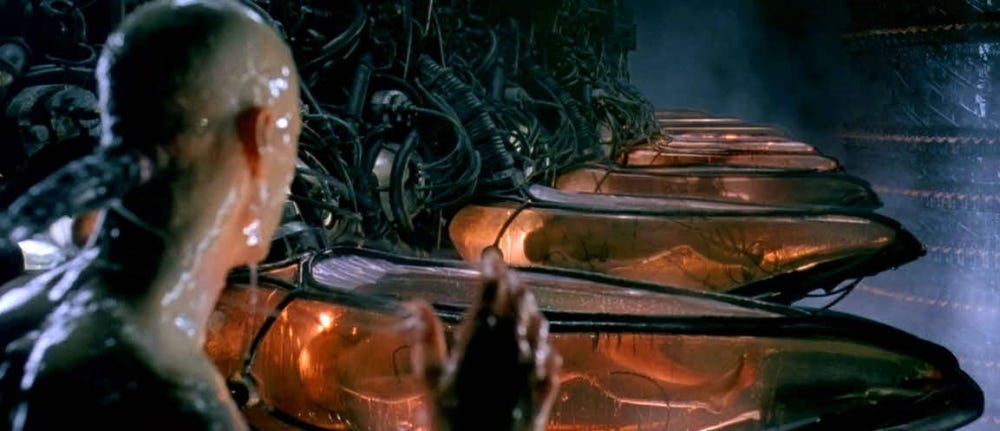The Mahabharata foretold synthetic wombs, leftoid lunacy, and nuclear bombs. Hindus revere their ancient “seers” for a reason
Last week, the German bio-propagandist Hashem Al-Ghaili shocked the world with his concept video EctoLife: The World’s First Artificial Womb Facility. The shot opens on a designer baby factory, then pans across rows of steel womb-pods. The little miracles inside are tended by AI modulators and faceless nurses in hazmat suits.
Seeing these “30,000 lab-grown babies” packed together in tiered grids, I could almost smell the fresh bleach on top of stale piss.
“With EctoLife, miscarriage and low sperm count are a thing of the past,” the chatbot narrator promises. “Prior to placing the fertilized embryo of your baby inside the growth pod, in vitro fertilization is used to create and select the most viable and genetically superior embryo, giving your baby a chance to develop without any biological hurdles.”
What sort of unfit mother could say no to that?
Besides, with global sperm counts plummeting and gay marriage rising, these eugenic EctoLife pods may be the only Future™ that humanity can hope for. That’s the sales pitch, anyway.

The ad’s dismal set is suspiciously reminiscent of the pink pod scene in the The Matrix, where Neo awakens to the reality that human beings are nothing more than bio-batteries used to power an artificial intelligence swarm.
Even more so, the rows of synthetic wombs remind me of another classic—the ancient Hindu epic, the Mahabharata. Compiled around 2,200 years ago from far older sources, the entire text is roughly 15 times the length of the Bible. It’s also the first myth, so far as I know, to feature a pod-baby production line.
As a whole, the Mahabharata is a brilliant latticework of stories within stories, filled with blood feuds and bad omens, hurtling toward cosmic disintegration, and laced with more metaphor and hyperbole than a womanizing Hebrew warrior hacking off two hundred Philistine foreskins to win the king’s lovely daughter.
The epic culminates in an apocalyptic war between the mostly good princes, the Pandavas, and their relatively wicked cousins, the Kauravas. As with many heroes of yore, the former were born of chaste women impregnated by the gods. The latter, being fairly demonic, were gestated in artificial wombs and born under a bad sign.
The Kauravas were the descendants of a blind king and his devoted wife, Gandhari, who was so devoted to her husband, she blindfolded herself for life. Despite this inauspicious arrangement, she was promised by a seer that she would conceive a hundred sons.
The most accessible version of this story comes from William Buck’s beautiful retelling (slightly edited here for simplicity’s sake):
The seer Vyasa came to the king and said, “Gandhari carries one hundred sons. She will give birth at the end of two years. Be patient and know that there is no danger to her, and I will return when it is time.”
Vyasa then spoke with the prince, Bhishma, so that when Gandhari gave birth there were a hundred bronze jars filled with clear butter (ghee), ready and hidden in the palace garden. From her womb came a hard ball of flesh that Vyasa took from her and washed in cool water.
Everyone at the palace was disgusted by this monstrous birth. It was clear the royal dynasty had been tainted by something impure and unnatural:
“Here are your hundred sons,” he told Gandhari, “but there is more to do before they are formed.”
Vyasa divided that ball of flesh into pieces, about the size of a thumb. As he worked in the garden, Bhishma put each piece into a jar and sealed it. At the end there was an extra piece.
Bhishma brought another jar and Vyasa said, “There are now one hundred sons and one daughter. See that the jars are not opened for two more years; then they will be born.”
The firstborn was Duryodhana. He emerged from his jar dripping with ghee and “braying like an ass.” In response, donkeys, jackals, and crows all over the kingdom wailed in terror. Then came the storm winds. One by one, the next hundred jars were cracked open.
These portents proved fatal. The Kauravas would go on to get the entire kingdom killed in a genocidal war. On a more cosmic scale, these unholy jar-babies foreshadowed cosmic degeneration and the coming dark age—the Kali Yuga, or “Age of the Black Goddess.”
Read the rest here:














